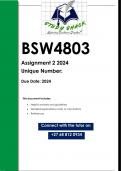BSW4803
Assignment 2 2024
Unique Number:
Due Date: 2024
This document includes:
• Helpful answers and guidelines
• Detailed explanations and/ or calculations
• References
Connect with the tutor on
+27 68 812 0934
,© Study Shack 2024. All rights Reserved +27 68 812 0934
, SERVICE FIELD WOMEN: DEVELOPMENTAL NEEDS
INTRODUCTION
Women in the service field play a crucial role in the development and well-being
of individuals and communities. This research project aims to investigate the
developmental needs of women working in the service field, with a focus on the
decolonization of welfare services.
The project will involve a comprehensive fact-finding process to gather
information systematically, ensuring a thorough understanding of the issues at
hand. Stakeholders, including clients, will be actively engaged and encouraged
to participate in the research process, with their input being valued and included
in the final conclusions. A seminar will be organized to present the research
findings, with thorough preparations made to ensure maximum attendance and
participation. Professional presentations using appropriate aids such as
audio/visual materials will be utilized to effectively communicate the research
outcomes.
Ultimately, the project will culminate in a concise set of recommendations for
the improvement and decolonization of welfare services in the selected field of
service, providing valuable insights for the development and support of women
in this crucial sector.
1. FACT-FINDING PROCESS
The fact-finding process is an essential component in understanding the
developmental needs of women in the service field. To ensure that information
is gathered in a systematic and comprehensive manner, several methodologies
and sources are employed. This process involves a combination of quantitative
and qualitative research techniques, which provide a holistic view of the
challenges and opportunities faced by women in various service sectors.
Step 1: Literature Review
© Study Shack 2024. All rights Reserved +27 68 812 0934
, The first step in the fact-finding process is conducting an extensive literature
review. Scholarly articles, books, and industry reports related to women in the
service sector are examined. Databases such as PubMed, JSTOR, and Google
Scholar are utilized to access peer-reviewed articles. Keywords like "women in
service industry," "career development," "gender disparities," and "workplace
challenges" are used to find relevant studies. The literature review helps in
understanding existing research, identifying gaps, and providing a theoretical
framework for the study (Webster & Watson, 2002).
Step 2: Surveys and Questionnaires
Surveys are one of the most efficient ways to gather information from a large
sample size. Surveys and questionnaires are designed to collect quantitative
data on various aspects such as career progression, job satisfaction, workplace
challenges, and training needs of women in the service field. These instruments
include both closed and open-ended questions to capture numerical data and
personal insights. Online platforms like SurveyMonkey or Google Forms
facilitate the distribution and collection of responses, ensuring a wider reach
and higher response rate (Fowler, 2014).
Step 3: Interviews and Focus Groups
To gather in-depth qualitative data, interviews and focus groups are conducted.
Semi-structured interviews with female employees, HR managers, and industry
experts provide nuanced perspectives on developmental needs. Focus groups,
consisting of 6-10 participants, encourage discussions on shared experiences
and collective challenges. These qualitative methods enable the exploration of
complex issues that may not be evident through surveys alone. Interviews and
focus groups are often recorded and transcribed for detailed analysis (Kvale &
Brinkmann, 2009).
Step 4: Case Studies
© Study Shack 2024. All rights Reserved +27 68 812 0934




